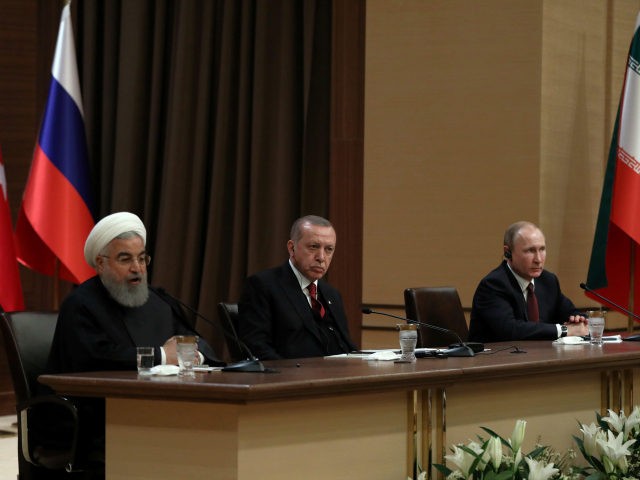Turkish President Recep Tayyip Erdogan, Iranian President Hassan Rouhani, and Russian President Vladimir Putin convened in Ankara this week, discussing ways to end the ongoing Syrian civil war while isolating the United States from the region.
All four countries have a military presence in Syria.
“The future of Syria and our region cannot be left to a few terrorists,” Erdogan said at a news conference marking the end of the summit, according to the Washington Post. “Without peace in Syria, there cannot be peace in Turkey. There is a difficult road ahead.”
The withdrawal of the United States from Syria, and the region, would create a power vacuum that Iran and Russia would likely fill.
According to the Washington Post, Ahmed al-Borai, an editor at TRT World, said Wednesday:
With the vacuum the United States is leaving in the region, and also with the reckless and careless moves of the Trump administration — like completely disregarding the concerns of Turkey, completely spoiling all the communication channels with Russia — it will lead to the empowerment of these three major powers.
Despite his reluctance to do so, on Tuesday, President Donald Trump reportedly agreed to keep roughly 2,000 troops in Syria until the Islamic State terrorist group is defeated.
Also on Wednesday, Iran’s defense chief Brigadier General Amir Hatami said that defeating the Islamic State (Daesh) is equal to defeating the United States and its power in the region.
“The defeat of Daesh means the defeat of America’s regional policy and thus we should expect that this defeat would probably mark the beginning of a new era of hostilities and regional tensions,” Hatami said at the Moscow Conference on International Security (MCIS).
In 2016, Iran’s Supreme Leader Ayatollah Ali Khamenei tweeted that the U.S. created and is backing the Islamic State. He wrote, “US aim of making & backing DAESH is to sow discord in Islamic Ummah, defame true Islam & promote Wahabbi Islam which is far from true Islam.”
Adelle Nazarian is a politics and national security reporter for Breitbart News. Follow her on Facebook and Twitter.

COMMENTS
Please let us know if you're having issues with commenting.